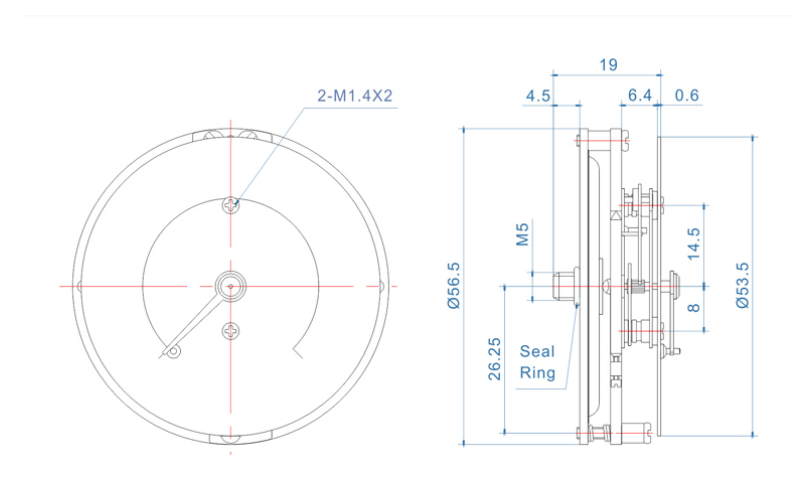
Июл . 27, 2024 22:16 Back to list
High-Accuracy Digital Pressure Gauges for Precise Measurement in Various Applications
Precision Digital Pressure Gauges Advancements and Applications
In the realm of industrial measurement, precision is paramount. Among the array of instruments used for pressure measurement, digital pressure gauges have emerged as one of the most reliable and efficient tools available today. These gauges offer enhanced accuracy, user-friendly interfaces, and advanced features that make them indispensable in various applications across multiple industries.
What are Digital Pressure Gauges?
Digital pressure gauges are sophisticated instruments that provide real-time pressure readings in an easily interpretable digital format. Unlike their analog counterparts, which rely on mechanical components such as springs and needles, digital gauges utilize electronic sensors to measure pressure. This innovation allows for greater precision and the ability to display measurements instantly, often with higher resolution and accuracy.
Advantages of Precision Digital Pressure Gauges
1. High Accuracy Precision digital pressure gauges are designed to deliver accurate readings, often with an accuracy rating of ±0.25% of the full scale or better. This level of accuracy is essential for critical applications such as testing, calibration, and process control where even minor discrepancies can lead to significant errors.
2. Ease of Use The digital display eliminates the challenges associated with reading analog gauges, making it easier for operators to obtain and interpret data quickly. Many models feature backlit displays, large fonts, and intuitive interfaces that enhance usability in dimly lit or high-pressure environments.
3. Data Logging Capabilities Advanced digital pressure gauges come equipped with data logging features that allow users to record pressure readings over time. This functionality is vital for monitoring trends, conducting analyses, and ensuring compliance with safety and quality standards.
precision digital pressure gauges products

4. Versatility Digital pressure gauges are available for a wide range of pressure types, including gauge, absolute, and differential pressure. This versatility makes them suitable for various applications in the oil and gas, water treatment, pharmaceuticals, and manufacturing industries.
5. Robust Construction Many precision digital gauges are designed to withstand harsh conditions. They are often constructed with durable materials that provide resistance to chemicals, temperature fluctuations, and physical impacts, ensuring reliability and longevity in demanding environments.
Applications of Precision Digital Pressure Gauges
The versatility and accuracy of digital pressure gauges make them ideal for a multitude of applications. In the industrial sector, they are commonly used for monitoring pressure in hydraulic and pneumatic systems, ensuring optimal performance and safety. In the food and beverage industry, these gauges are essential for maintaining proper pressure in processes such as carbonation, filtration, and packaging.
In the environmental sector, digital pressure gauges play a crucial role in water treatment facilities, where they monitor pressure levels in various stages of treatment and distribution. Additionally, in the automotive industry, engineers use precision digital gauges for various testing applications, including tire pressure measurements and fuel system assessments.
Conclusion
Precision digital pressure gauges are transforming the way industries measure and manage pressure. Their high accuracy, user-friendly features, and adaptability to various applications make them a vital tool in modern industrial processes. As technology continues to evolve, we can expect further advancements in digital pressure gauges that will enhance their functionality and expand their usability, ultimately driving efficiency and safety across numerous sectors. Whether for ensuring quality control or maintaining system integrity, precision digital pressure gauges will undoubtedly remain at the forefront of pressure measurement technology.
-
High-Precision 5 Valve Manifold Differential Pressure Gauge Suppliers
NewsApr.29,2025
-
High-Precision Diaphragm Vacuum Pressure Gauges Manufacturers & Quotes
NewsApr.29,2025
-
Omega Differential Pressure Gauges High Accuracy & Durability
NewsApr.28,2025
-
Low Pressure Differential Pressure Gauges Precision Solutions & Quotes
NewsApr.28,2025
-
Digital Diaphragm Pressure Gaauge Precision Measurement & OEM Quotes
NewsApr.28,2025
-
Differential Pressure Gauge China Price High-Accuracy & Best Quotes
NewsApr.28,2025
